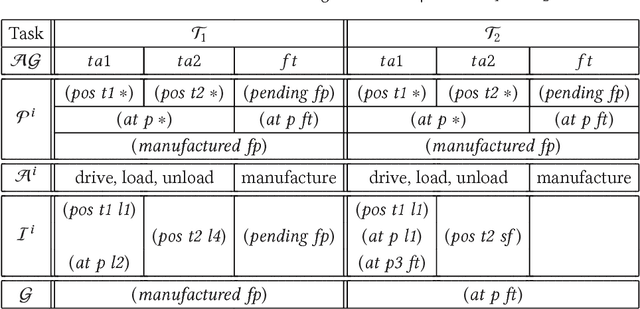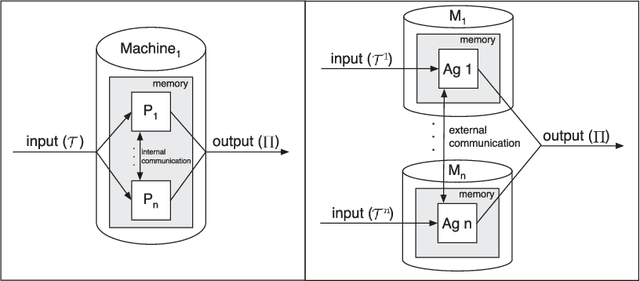Alejandro Torreño
Cooperative Multi-Agent Planning: A Survey
Nov 24, 2017



Abstract:Cooperative multi-agent planning (MAP) is a relatively recent research field that combines technologies, algorithms and techniques developed by the Artificial Intelligence Planning and Multi-Agent Systems communities. While planning has been generally treated as a single-agent task, MAP generalizes this concept by considering multiple intelligent agents that work cooperatively to develop a course of action that satisfies the goals of the group. This paper reviews the most relevant approaches to MAP, putting the focus on the solvers that took part in the 2015 Competition of Distributed and Multi-Agent Planning, and classifies them according to their key features and relative performance.
* 34 pages, 4 figures, 4 tables
A Flexible Coupling Approach to Multi-Agent Planning under Incomplete Information
Jan 29, 2015



Abstract:Multi-agent planning (MAP) approaches are typically oriented at solving loosely-coupled problems, being ineffective to deal with more complex, strongly-related problems. In most cases, agents work under complete information, building complete knowledge bases. The present article introduces a general-purpose MAP framework designed to tackle problems of any coupling levels under incomplete information. Agents in our MAP model are partially unaware of the information managed by the rest of agents and share only the critical information that affects other agents, thus maintaining a distributed vision of the task.
* 40 pages, 10 figures
An approach to multi-agent planning with incomplete information
Jan 28, 2015


Abstract:Multi-agent planning (MAP) approaches have been typically conceived for independent or loosely-coupled problems to enhance the benefits of distributed planning between autonomous agents as solving this type of problems require less coordination between the agents' sub-plans. However, when it comes to tightly-coupled agents' tasks, MAP has been relegated in favour of centralized approaches and little work has been done in this direction. In this paper, we present a general-purpose MAP capable to efficiently handle planning problems with any level of coupling between agents. We propose a cooperative refinement planning approach, built upon the partial-order planning paradigm, that allows agents to work with incomplete information and to have incomplete views of the world, i.e. being ignorant of other agents' information, as well as maintaining their own private information. We show various experiments to compare the performance of our system with a distributed CSP-based MAP approach over a suite of problems.
* 6 pages, 2 figures
FMAP: Distributed Cooperative Multi-Agent Planning
Jan 28, 2015



Abstract:This paper proposes FMAP (Forward Multi-Agent Planning), a fully-distributed multi-agent planning method that integrates planning and coordination. Although FMAP is specifically aimed at solving problems that require cooperation among agents, the flexibility of the domain-independent planning model allows FMAP to tackle multi-agent planning tasks of any type. In FMAP, agents jointly explore the plan space by building up refinement plans through a complete and flexible forward-chaining partial-order planner. The search is guided by $h_{DTG}$, a novel heuristic function that is based on the concepts of Domain Transition Graph and frontier state and is optimized to evaluate plans in distributed environments. Agents in FMAP apply an advanced privacy model that allows them to adequately keep private information while communicating only the data of the refinement plans that is relevant to each of the participating agents. Experimental results show that FMAP is a general-purpose approach that efficiently solves tightly-coupled domains that have specialized agents and cooperative goals as well as loosely-coupled problems. Specifically, the empirical evaluation shows that FMAP outperforms current MAP systems at solving complex planning tasks that are adapted from the International Planning Competition benchmarks.
* 21 pages, 11 figures
 Add to Chrome
Add to Chrome Add to Firefox
Add to Firefox Add to Edge
Add to Edge